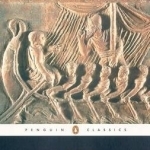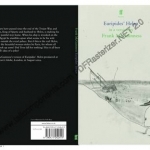Search
Search results
Betty Fussell recommended The Odyssey in Books (curated)
Emily Wilson recommended Helen in Books (curated)
Hazel (1853 KP) rated Dreaming of Antigone in Books
Dec 17, 2018
<i>This ARC was provided by the publisher via NetGalley in exchange for an honest review
Dreaming of Antigone</i> is a contemporary tragedy about sixteen-year-old Andria in the aftermath of the death of her twin sister Iris. It has been almost six months since Iris overdosed on heroin, and also the same amount of time since Andria last had an epileptic seizure. Feeling overwhelmed by her mother’s overprotectiveness, Andria is counting down the days until she can reapply for her driving license – freedom. Only fourteen days to go; unless she has another seizure…
Although she is not over her sister’s death, Andria is keeping her emotions in check; but then, Iris’ ex-drug addict boyfriend, Alex, comes back to school. Andria feels hatred toward him and angrily blames him for what happened to her sister. She is beyond frustrated to discover that she has to work alongside Alex in the library after school. However their love of poetry begins to bond them together, causing Andria to question how she really feels. When more tragedy strikes in the form of her stepfather, Andria is glad to have Alex by her side.
<i>Dreaming of Antigone</i> is a mix of high culture and pop culture. It is written for the contemporary teenager who enjoys love stories, yet it also contains a few highbrow topics. Firstly, as referenced in the title, is the Greek play <i>Antigone</i>. Andria is studying this tragedy at school and likens herself and Iris to the key characters, Antigone and Ismene. Secondly is astronomy. Andria is passionate about the stars and educates the reader a little about the names of constellations and the position of the stars and planets in the solar system. Thirdly, as already mentioned, there are lots of poetry citations.
I was a little disappointed that there was not more focus on <i>Antigone</i>, as this is what attracted me to the novel in the first place. Robin Bridges gives a brief overview of the play for the benefit of readers who are unfamiliar with it, however for readers, like myself, who have studied Sophocles’ tragedies, there is not much more to gain from this reference.
Bridges tackles quite a number of difficult subjects in <i>Dreaming of Antigone</i>. There is the obvious issue of drug abuse, which killed Iris. In this case, Iris was a victim of the addiction, however Bridges counters this with Alex, the survivor, thus saying that it is possible to recover from such a dangerous habit. Later on in the story other challenging problems crop up, for example suicide and sexual abuse. Thankfully Bridges deals with these in a mature and gentle manner, so as not to distress the reader. Having said this, some readers may struggle with this triggering content.
Overall, whilst this was not a terrible book, it was not exactly what I was expecting, and therefore a bit of a disappointment. It is for this reason that I am not giving <i>Dreaming of Antigone</i> more than three stars. Other readers with fewer expectations may enjoy this novel a lot more.
Dreaming of Antigone</i> is a contemporary tragedy about sixteen-year-old Andria in the aftermath of the death of her twin sister Iris. It has been almost six months since Iris overdosed on heroin, and also the same amount of time since Andria last had an epileptic seizure. Feeling overwhelmed by her mother’s overprotectiveness, Andria is counting down the days until she can reapply for her driving license – freedom. Only fourteen days to go; unless she has another seizure…
Although she is not over her sister’s death, Andria is keeping her emotions in check; but then, Iris’ ex-drug addict boyfriend, Alex, comes back to school. Andria feels hatred toward him and angrily blames him for what happened to her sister. She is beyond frustrated to discover that she has to work alongside Alex in the library after school. However their love of poetry begins to bond them together, causing Andria to question how she really feels. When more tragedy strikes in the form of her stepfather, Andria is glad to have Alex by her side.
<i>Dreaming of Antigone</i> is a mix of high culture and pop culture. It is written for the contemporary teenager who enjoys love stories, yet it also contains a few highbrow topics. Firstly, as referenced in the title, is the Greek play <i>Antigone</i>. Andria is studying this tragedy at school and likens herself and Iris to the key characters, Antigone and Ismene. Secondly is astronomy. Andria is passionate about the stars and educates the reader a little about the names of constellations and the position of the stars and planets in the solar system. Thirdly, as already mentioned, there are lots of poetry citations.
I was a little disappointed that there was not more focus on <i>Antigone</i>, as this is what attracted me to the novel in the first place. Robin Bridges gives a brief overview of the play for the benefit of readers who are unfamiliar with it, however for readers, like myself, who have studied Sophocles’ tragedies, there is not much more to gain from this reference.
Bridges tackles quite a number of difficult subjects in <i>Dreaming of Antigone</i>. There is the obvious issue of drug abuse, which killed Iris. In this case, Iris was a victim of the addiction, however Bridges counters this with Alex, the survivor, thus saying that it is possible to recover from such a dangerous habit. Later on in the story other challenging problems crop up, for example suicide and sexual abuse. Thankfully Bridges deals with these in a mature and gentle manner, so as not to distress the reader. Having said this, some readers may struggle with this triggering content.
Overall, whilst this was not a terrible book, it was not exactly what I was expecting, and therefore a bit of a disappointment. It is for this reason that I am not giving <i>Dreaming of Antigone</i> more than three stars. Other readers with fewer expectations may enjoy this novel a lot more.


